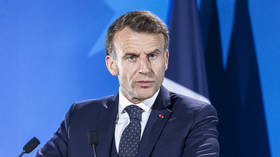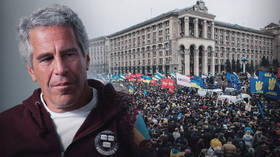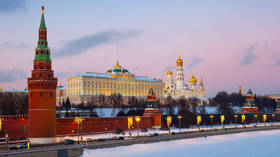‘Occupy’ movement in bid to save German democracy
The pro-equality Occupy movement is rapidly gathering pace in Germany, with fresh protests starting in the capital Berlin and the country's financial heartland of Frankfurt.
Thousands are set to join the demonstrations on Saturday, seeking to draw attention to rampant corporate greed and the increasing poverty of the masses. The German Occupy movement has also made significant steps in legitimizing itself, having earned the support of two major political factions.According to police, more than 10,000 people took to the streets of two major German cities, protesting against the banks' dominance.In Berlin, demonstrators have formed a human chain surrounding parts of the government district to call for an end to excesses of financial speculation and urge the authorities to dismantle big banks, AP reports.Frankfurt police said some 9,000 people were peacefully protesting in the city center near the European Central Bank's office block.“We want more democracy and more transparency, and that the big banks and other big companies [stop] abusing the power of their money,” one of the “Occupy Frankfurt” campaigners, Thomas Leuten, told RT. “Only a mass of people will change this.”RT spoke to one of the organizers of the event and a spokesperson for the pro-equality movement “Attac Germany”, Max Bank. He believes that if democracy is to survive in Germany, now is the time to make a stand.“We have a worldwide problem in the financial sector, which is absolutely deregulated, and we need further regulation in order to make the sector compatible with democratic societies,” he told RT. “Otherwise, we will always see such measures as the enlargement of the EFSF that we saw a couple of weeks ago, [when] the German parliament pushed through within days.”Max Bank referred to the events of 2008 and 2009, when many banks were bailed out without any conditions at the time of the global financial crunch.“We need clear conditions for those banks [which] were bailed out,” he said. “That hasn’t happened in Germany, and that’s what we criticize, in order to make a clear sign that democratic societies can no longer tolerate … banks that can suppress our societies.”
Jutta Sundermann of the pro-equality 'Attac Germany' group, says Berlin is partly responsible for Europe's economic woes.“Germany is one of the countries that caused quite a lot of trouble we have in Europe now, because of the way international competition is organized,” she told RT. “Germany is very often on the winning side, but that means that we also export poverty and [unemployment].”Sundermann echoed Max Bank by referring to the recent crisis of 2008. Back then, taxpayers were forced to save banks, and eventually billions were thrown to bail them out. By doing this, the fundamental principles of democracy were jeopardized, she says.“People here on the streets, they agree… that it is needed to go out because everybody learns that democracy is in danger,” she said.“In our country too, there is no perspective, [it is not clear] how to go on if this crisis goes on further. And it will,” Sundermann concluded.














